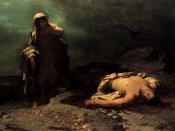In the play Antigone, Sophocles uses many important literary elements, but of the most important is irony. Three types of irony he uses are dramatic, attitudinal, and verbal irony. Sophocles' use of irony in Antigone has a great impact on the play. If Sophocles did not use irony in his play, the events in the scenes would have been very different from what they are now. Irony is also used to add suspense, making the reader wonder what was going to happen next? Sophocles successfully accomplished his goal, as will be shown in the following paragraphs.
Dramatic irony is when characters state something they believe is true, but the audience knows it is actually not the case. An example of dramatic irony would be one of the king Creon's statements. The Sentry comes to reveal that Creon's law had been broken, and Polyneices had been buried. Creon then asks, "And the man who dare do this?"(Scene 1, 88).
Creon assumes the perpetrator was a man when, in fact, the audience knows that Antigone had committed the crime. This reveals Creon's thinking that no one but a man would commit a crime like that. This hints further conflict in the play. Another example of dramatic irony is when the Chorus states, "But now in the beautiful morning of victory let Thebes of the many chariots sing for joy! With hearts for dancing we'll take leave of war: our temples shall be sweet with hymns of praise, and the long night shall echo with our chorus" (Parodos, Antistrophe 2). Here, the Chorus states that Thebes can now go back to living in peace and the great nation of Thebes would be restored. The reader knows, in fact, that this is not true. In the previous scene, Antigone reveals that she plans...



Great work
The author doesn't simply state that the story Antigone uses irony, the author actually states what irony is used. Great job!
5 out of 5 people found this comment useful.